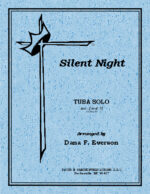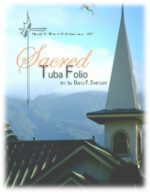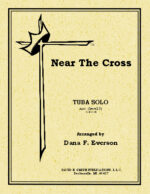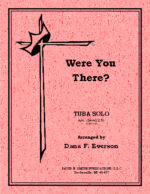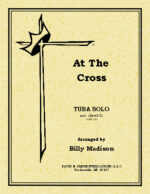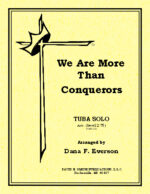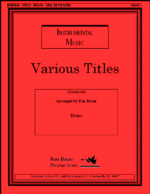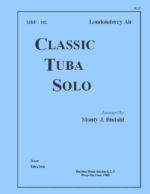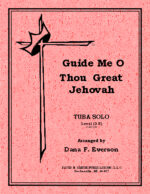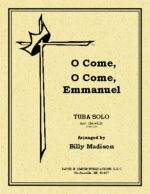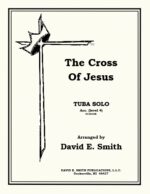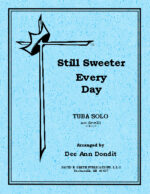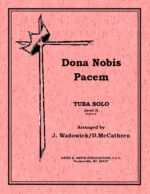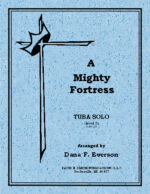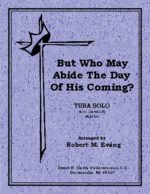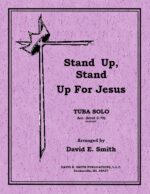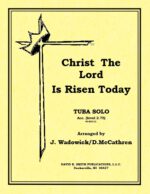-
Silent Night
$4.50An accompanied tuba solo that begins with a gentle piano introduction. The soloist then presents the tune with subtle modifications. The second section progresses with even greater melodic enhancement. With a modulation the solo deviates the melody with an almost obbligato-like fashion. With further modulation the solo line gravitates to a style reminiscent to the second section. The coda section is patterned after the first section and then settles down to sweet silence.
-
-
Arise, My Soul Arise
$5.00A Tuba solo that opens with a simple, dignified and militant style! The middle section is more delicate with the theme embellished to give a sense of bouyancy then migrating over to a more flowing and uplifting feeling. The final section begins lower and then starts its rising to a powerful statement of “having arrived!”
-
Near The Cross
$4.00This is an expressive level three solo with piano accompaniment that employs a celtic lilt in its melodic flow. It modulates upward and adds excitement with the newly introduced motivic counterlines in the solo, only to begin its final movement downward in a meditative repose.
-
Were You There?
$4.00This solo piece opens with a sense of reverence presenting the melody in a gently modified fashion. The middle section gains intensity rhythmically with a rhapsodic form of theme variations. It continues to elevate only to relax into final peace.
-
Tons Of Tunes For Church
$12.95With CD accompaniment, 32 familiar melodies like: Abide With Me, Now We Thank We All Our God, Swing Low, Onward Christians Soldiers and more
-
At The Cross
$4.50This is a tuba solo with piano which presents the opening melody in a straight forward manner. The middle sections use various cleverly designed counter melodies in the solo part. The final section establishes the original melody.
-
We Are More Than Conquerors
$4.50This solo with piano is presented in a militaristic venue. The interlude section displays fanfare motifs and then moves back to the opening style. The piece ends in a bold statement of faith-musically.
-
Blessed Assurance
$5.00Back in 1873, “Mrs. Joseph F. Knapp (Phoebe) composed a melody and played it over to me two or three times on the piano. She then asked what it said. Fanny Crosby replied, “Blessed assurance, Jesus is mine!” These words became the tune’s inspiration.
-
Londonderry Air
$4.95This Tuba solo with piano accompaniment is based on a classic Irish folk song. The intermediate variations will add interest for the intermediate trombone player. The arrangement is from the teaching files of Monty Budahl and is useful for vesper, offertory, and special.
-
Guide Me O Great Jehovah
$4.50This brass solo with piano, this piece is written in march style displaying great resolve. The central sections present new thematic material followed by modified titled hymn materials giving a sense of unity to the piece. It ends with a solid flourish.
-
O Come, O Come Emmanuel
$4.00A solo with piano accompaniment. After a solid introduction the arrangement presents the melody with a simple statement. After several melodic statements the soloist then presents itself with a delightful counterline. It is finalized with declamation.
-
The Love Of God
$4.50A brass solo with piano that expresses itself with altered melody lines, rhythm-wise, giving a great opportunity for great expressiveness. The middle section is enhanced by beautiful counterlines moving to melodic motifs to the end.
-
-
-
The Cross Of Jesus
$6.00A tuba solo which begins with a sense of agony in the piano using the tune of “Beneath The Cross Of Jesus.” The solo then makes a declamatory statement and then becomes very expressive in a recitative-like section. This section is expressive and then becoming more vigorous using thematic material from “At The Cross.” After another transition the piece become vibrant using the theme of “The Cross Is Not Greater than His Grace.” A swift modulation and a faster tempo the piece ramps up a vigorous flair where it elevates to a strong crescendo including some triple tongue motives.
-
My Anchor Holds
$4.50This solo is in a march style throughout. It begins with little fanfare figures in the piano and then as it progress the soloist and piano exchange rolls. The second section is in a variation style while the third section is more expressive. The final section is more boisterous ending on a solid footing.
-
Dona Nobis Pacem
$4.50This tuba solo begins with a brief motif in the piano and then begins a series of variations and the soloist presents the theme. The variations are sometimes florid, other times plaintive, some times imitative and finally bold.
-
A Mighty Fortress
$4.50This tuba solo begins with melodic variation with various rhythmic devices. The middle section augments the melody, and then concludes much the way it began.
-
But Whom May Abide The Day…
$4.00Taken from the “Messiah”, this solo with piano is essentially a transcription of the original work. It features sufficient counterpoint between the various instruments.
-
Lead On O King Eternal
$4.50Originally in a duple meter this arrangement very cleverly is in a 6-8 march style. It progresses in a rather processional manner and then transitions to a slower reflective expression. The piece returns to its former style and then ends on a declamatory note.
-
Christ The Lord Is Risen
$5.50A brass solo in a Theme and Variation form. It starts out with a joyous introduction and then breaks into an antiphonal set of response of the tune. The first variation is essentially a descant while the piano carries the tune. The second variation is more contrapuntal in the piano while the solo carries on a fanfare-like obbligato. After a brief transition the piece concludes with a bold statement of the tune while being under-pinned with a walking bass line.
-
O Mighty God
$4.50After a majestic introduction the piece settles down into a softer and more expressive rendition of the tune “How Great Thou Art.” The middle section is a variation of the first section with the melody in the piano while the soloist plays an obbligato styled line. Then the piano present a transition in a majestic style modulating to a new key with the solo line presenting the tune in again expressive style with a lot of dynamic shading. The piece concludes in a majestic sense of finality.

